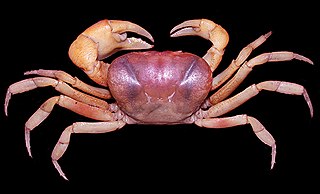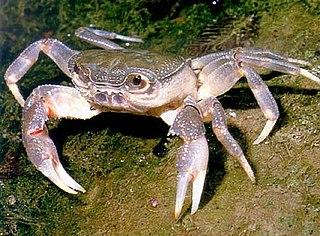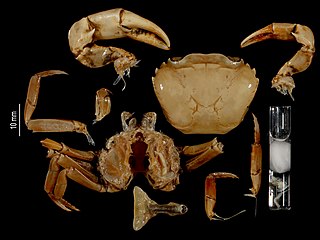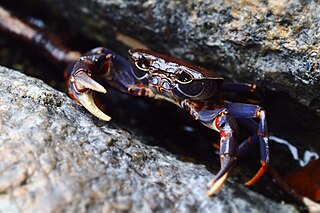Afrithelphusa is a genus of freshwater crabs in the family Potamonautidae. It contains four species, all of which were formerly listed as critically endangered by the International Union for Conservation of Nature (IUCN). They are all endemic to the Upper Guinean forests of Guinea and Sierra Leone.

Parathelphusinae is a subfamily of freshwater crabs, which was formerly placed in the family Parathelphusidae; they are mainly found in South and Southeast Asia, but also found elsewhere in Asia and in Australia

Potamonautes is a genus of African freshwater crabs in the family Potamonautidae. It is both the most widespread and most diverse genus of African freshwater crabs, including more than half the species of this continent. They are found in most freshwater habitats of the African mainland and some species are semi-terrestrial.

The Gecarcinucidae are a family of true freshwater crabs. The family Parathelphusidae is now demoted to the rank of subfamily, as the Parathelphusinae, within the Gecarcinucidae. "Family" Parathelphusidae is now considered as a junior synonym.

Pseudothelphusidae is a family of freshwater crabs found chiefly in mountain streams in the Neotropics. They are believed to have originated in the Greater Antilles and then crossed to Central America via a Pliocene land bridge.

Potamidae is a family of freshwater crabs. It includes more than 650 species and nearly 100 genera, which are placed into two subfamilies: Potaminae and Potamiscinae.

Somanniathelphusa is a genus of freshwater crabs found in southeast China, Taiwan, and southeast Asia. It includes the following species:

Geosesarma is genus of small freshwater or terrestrial crabs, typically less than 10 mm (0.4 in) across the carapace. They live and reproduce on land with the larval stages inside the egg. They are found from India, through Southeast Asia, to the Solomon Islands and Hawaii.
Hainanpotamon vietnamicum is a species of crab. Originally described as a species of Geothelphusa, it is now treated as part of the genus Hainanpotamon, although it has also been suggested as a member of Tiwaripotamon. It is only known from a single locality in Cúc Phương National Park, Ninh Bình Province, Vietnam.

Potamon fluviatile is a freshwater crab found in or near wooded streams, rivers and lakes in Southern Europe. It is an omnivore with broad ecological tolerances, and adults typically reach 50 mm (2 in) in size during their 10–12 year lifespan. They inhabit burrows and are aggressive, apparently outcompeting native crayfish.

Potamon is a genus of freshwater or semiterrestrial crabs mainly found from Southern Europe through the Middle East, and as far east as north-western India. The only exception is the North African P. algeriense, which also is the only potamid of mainland Africa. Twenty species are currently recognised:. These crabs are omnivores that have a broad ecological tolerance. The adult Potaman reach up to 50 mm in size during their 10-12 year life span.
Johora singaporensis, also known as the Singapore stream crab or Singapore freshwater crab, is an endangered species of freshwater crab endemic to Singapore. It grows to a size of 30 millimetres (1.2 in) wide.
Kingsleya is a genus of crabs in the family Pseudothelphusidae, containing the following species:
Brasiliothelphusa tapajoensis is a species of freshwater crabs in the family Pseudothelphusidae, and the only species in the genus Brasiliothelphusa. It was described in 1986 from specimens caught in the Rio Tapajós in the state of Pará, Brazil. It is listed as Data Deficient on the IUCN Red List.

Around 1,300 species of freshwater crabs are distributed throughout the tropics and subtropics, divided among eight families. They show direct development and maternal care of a small number of offspring, in contrast to marine crabs, which release thousands of planktonic larvae. This limits the dispersal abilities of freshwater crabs, so they tend to be endemic to small areas. As a result, a large proportion are threatened with extinction.
Hainanpotamon is a genus of freshwater crabs, containing the following species:

Demanietta is a genus of freshwater crabs found in Indochinese Peninsula of Southeast Asia. Most of them are found in fast flowing water habitats, giving their common name "waterfall crabs". The genus contains ten described species:

Johora thaiana is a species of freshwater crab described from specimens found in Thailand, as the name was derived. Most species in this genus are found in Singapore and Peninsular Malaysia so this is the most northern species of the genus. The crab is completely aquatic and can be found under rocks or vegetation in flowing streams and adjacent pools. However, they tend to inhabit sheltered habitats with slower water. They are active more at night.

Eosamon is a genus of freshwater crabs in the subfamily Potamiscinae, found in East and South-East Asia.

Nanhaipotamon is a genus of freshwater crabs, in the subfamily Potamiscinae, found in southern China and Taiwan. As of 2018, 18 species have been described. The genus is named after the South China Sea, for it occurs mostly in coastal areas.











